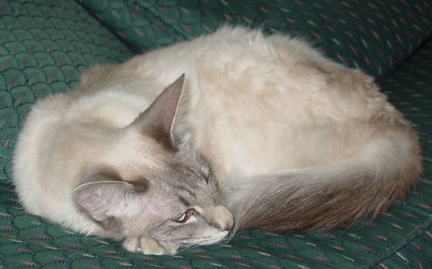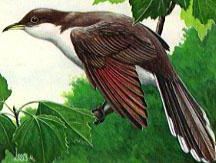

I have not always been a cat-lover. My parents considered all animals to be messy and unhygienic and rejected all of my sister’s and my entreaties to buy cuddly pets. Their only concession was that we were allowed to have two distinctly uncuddly pets – goldfish. The goldfish were named Bubble and Squeak and you could tell one from the other because Bubble was the bigger one. It didn’t occur to me at the time that, of any two goldfish, there would almost always be a bigger one, so my ability to focus my love accurately on my pets was somewhat illusory. My mother later confided in me that there were actually many Bubbles and many Squeaks over the years. She would feed them every morning before the children came down for breakfast and would check for vital signs at that point – if one of them failed the test, she would scoop it out and flush it down the toilet and it would be replaced by the end of the day. I didn’t have a clue.
As an adult, though, I initially inherited my parents’ feelings about domestic animals. Who needs the aggravation? If you decide to leave town, just do it – no messing around arranging for neighbors to come and feed and care for your pets. But my first wife had grown up dealing with dogs and cats and she certainly knew how to deal with me. One day, she simply showed up with a kitten that had been abandoned in a subway station and rescued by one of her co-workers. My heart melted like a pound of butter in the sun and I have been a cat-lover ever since.
Over the years, I have had a number of cat pets – mostly cattus ordinarius from the pound or from a friend’s litter. They have not all been ideal pets; in fact, some of them were quite nasty. That first little subway kitten was OK during daylight hours but as soon as it was dark, hunting season was declared and everything was in season, including my ankles. I had to get out of bed to turn out the light and then make a desperate dash back to the comparative safety of the covers before Min could sink her teeth into me. Guests, having had less practice performing such maneuvers, were generally even less fortunate than I. Nevertheless, once I had made the mental adjustment to become a cat-lover, I never looked back. Even while digging out the iodine for a lacerated guest, I never seriously considered returning Min to the subway to take the last train home.
We now own two cats. Volt, named after John Travolta for his piercing blue eyes, and Tillie. They are both sweet animals and Tillie in particular is the most loving cat I have ever known. When I sit on the couch, she comes and sits on my lap. When I walk across the room, she weaves in and out of my legs. She is distressed if I go to the bathroom without her and mews pitifully outside the door until I come out. She sleeps on our bed, propped up against my knee or curled up on my stomach. And while she is sprawled over me, purring like a little electric motor, I smile indulgently at her and think what a lucky guy I am to have such a wonderful cat.
But more recently, I have probed deeper into my own thinking. Why am I so lucky? What do I get out of this relationship? I get to buy cat food and to open the can for them each morning. I get to clean out their cat box and sweep up the crap that didn’t quite make it into the box. I get to clean up their messes when they throw up on our expensive oriental rugs. I get to take them to the vet and sign a check to cover their medical expenses. All of these activities suddenly strike me as the activities of a slave, not those of a master.
So what is it that I receive from them that allows me to happily take on this role as slave? Part of it is that they are living art, and I get a satisfaction from watching them move and pose that is somewhat analogous to the satisfaction Paul Getty gets from walking past one of the Matisse paintings in his living room – the perfection of their leap onto the kitchen table to grab a piece of my lunch, the delicate shading of their fur that is designed to camouflage them as they sneak up on some small rodent in order to rip it to pieces, their total relaxation as they sprawl on my knees. But ultimately I conclude that they are really just parasites, kind of like tapeworms, that have found a way to make a living off another species without providing anything in return.
But that still doesn’t explain how they get away with it. Tapeworms are stealthy, lurking in your intestines where you can’t see them, quietly living off the food that you thought you were buying for yourself. Cats are out there, in your face, please get that can open right now so I can eat. We are horrified by the thought of supporting tapeworms, but we do not serve cats by mistake, but by choice.
And then I realize that there is one other class of parasites that behaves in precisely the same way – our own children. They are appallingly expensive. They throw up on our expensive oriental rugs. Their excrement requires our personal attention. They emit ear-splitting shrieks when either happy or sad. And, despite Jonathan Swift's protestation that:
the public by and large seems not to have shown much enthusiasm for Swift’s modest proposal to eat our children; instead, we respond to all of this abuse with indulgent smiles and thoughts about what lucky parents we are to have such cute little tykes.
Now I understand that our refusal to eat our own children serves a valuable evolutionary purpose. But why should we not eat our kittens? Do not misunderstand me – I am suitably horrified by the notion. But it would be hard to explain to an alien anthropologist why we don’t.
The reason, I believe, is that they somehow manage to simulate whatever it is that our children have that prevents us from eating them. I don’t even know how to characterize that appeal. They don’t much look like human infants, being so small and furry. Nothing says love more than a cat purring at me, but my children don’t purr. I believe that we share enough of a genetic heritage with other mammals that young mammals all provoke some protective parental feelings, but cats seem to have distilled this to the ultimate essence, as if they emanate the exact pheromone that we are programmed to respond to in our children.
Did cats at some other time in history have something more concrete to offer man? There is what I think of as the myth of the working cat, gainfully employed by man to perform vermin control services. Did they ever really earn their keep by preventing the rats from nibbling on our babies? I don’t think so for a moment – why should a species that has developed such a refined form of parasitism bother to work for a living? I believe that they have always basically been love-mongers. Which is not to say that cats are insincere – I think that they are as infatuated with us as we are with them – but the end result is that they get board and lodging and we get the bill.
And I don’t mean to let dogs off the hook, either. Dogs have a better cover, which is their anxiety to do something helpful – herd some sheep for you? Flush some game? I suppose that we were more like symbiotes at some point in history, but I believe that in recent time we have deliberately bred dogs in order to sacrifice their utility in order to maximize the pheromone factor.
Reflecting further, it seems to me that cats and dogs cast light on another biological puzzle that I have previously been unable to understand. In the world of birds, there is a similar instance of parasitism that I am aware of – the cuckoo, which can’t be bothered to raise its own young and so lays its eggs in the nests of other birds. When the baby cuckoo hatches from the egg, it tosses the remaining eggs out of the nest and then enjoys the status of only child, allowing its foster parents to run themselves ragged caring for a fledgling that is not their own offspring and indeed does not look even remotely like the same species. What is going on here? Are they myopic – can’t they see they are being duped? Now I understand that the answer to that question is: yes, they can see that they are being duped, but they choose to go along with it. As she rams yet more worms into that ravenous cuckoo beak, the mother bird inhales more of the magic pheromones and smiles inwardly and says to herself “What a lucky bird I am to have such a wonderful cuckoo!”
 |
 |
Copyright © 2002 by Peter Lloyd-Davies. All rights reserved. Privacy Statement.